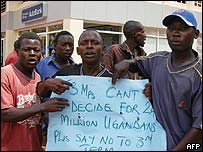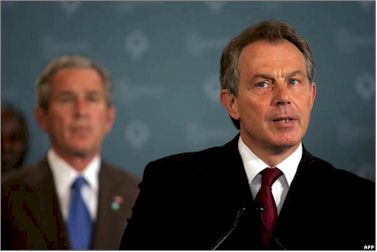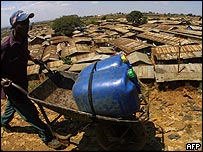![]()
The G8, Aid to Africa and Global Warming
![]()
Old Hickory
To take people's minds off the Iraq invasion fiasco as well as a fresh attempt to make an impact on the world, Blair has launched an African aid year. In the wake of a fresh version of the Band Aid record, that bored the shoppers stiff with its cant over the Yuletide days of 2004, Bob Geldof decided also to repeat the 1984 Band Aid live concert 20 years later, but felt he has learnt much from the first time. Back then, it was all about charity but this time he was out to get political action on the issue. This is to move from the free actions of charity to proactive coercive, and thus unfree political taxation of some to transfer earnings to others.
Blair set out to make his bid to the G8 summit and Geldof set up to back him up, at one stage by suggesting that a million men should demonstrate outside the G8 meeting place of Gleneagles, Scotland. Michael Grade of the BBC put on an Africa week to back Blair up. But before the G8 meeting took place, a meeting of the 53-nation strong African Union took place in Gaddafi's home town of Sirte, Libya, where Gaddafi told the other African leaders that they ought to be too proud to beg. An odd convert to liberalism, you might think, but he then went on to say that it is really the conditions put on the aid that he did not like. You do not tell a man you aid how to pray or what he should wear, Gaddafi said. He was really only asking for the ties to aid to be removed. He is not a liberal convert after all. Kofi Annan was also there, as he was later at the G8 meeting, and he announced at Sirte that there would-be United Nations Democracy Fund rewards for all the progress that African states had made in democracy of late! Almost all of the 53 states of the African Union were now democracies, he said, and they needed help with their election expenses. But the headline caused by Gaddafi's moaning might well give some of the others ideas. The African Union replaced the Organisation of African Unity three years ago. Like the EU, it looks like a very slow attempt at a superstate. But it is mainly used to encourage aid.

Africans question the value of aid
But why should Africa need aid? Why should they not make their own way in the world, as people elsewhere have? In the last 20 years, India and China have finally got round to exploiting the opportunities before them, and they have begun to grow economically but with no real thanks to foreign aid. There is no reason why there is going to be a special road via aid for Africa and there clearly was no such way for Europe, Japan and the USA . It does get easier and easier to make progress as lands can be brought up to date by free trade, and it is only protectionist folly that prevents that from happening. Fallacies like the old “infants industry argument” of List, though as popular as ever on the media and in the aid and charity lobby, are exactly wrong as the later a firm enters the market the more up to date its equipment is likely to be. So why all this clamour for aid?
The first answer to this is because we can see on our television screens that people are starving, but not all of them are starving. At the time of the first Band Aid there were up to a million in Ethiopia that were in trouble, and they had been put in trouble by a war with Eritrea that was backed by the USSR on both sides at one stage. However, the population of Ethiopia in 1984 was then about 55 million so most were not in trouble. Today they are up to 77 million, so they have largely thrived since and before 1984. They were about 5 million in 1945. Moreover, if Welsh nationalists blew up Birmingham's water supplies in the 1980s, we might well have had even more than a million in the UK in trouble.
A good book to read on all this is Equality, the Third World and Economic Delusion (1982) P.T. Bauer. The author's thesis is that the “Third Word is the creation of foreign aid: without foreign aid there is no Third World” (p87).The thesis is similar to mass unemployment being down to the dole that supports it. There is an enormous gap between tacit practical thinking that tends to be geared more to the world and the more explicit ideas that we adopt as special opinion from discourse with others. Those are often adopted as things we value rather than what seems to immediately fit the evidence and they usually relate to things that we do not experience at first hand. Most people seem not to think explicitly of the economy, but insofar as they do, they tend to think in zero sum terms so they are open to the idea that people in Africa are poor as a consequence of the UK being rich. Lenin's theory of imperialism fits this bill and rough versions of it are very popular in the colleges. It is part of college common sense amongst college students, most of whom do not study economics. But also many economic students take the subject's doctrines as abstractions that are not considered to be true. It has been said that visitors to Milton Friedman's Chicago seminars expressed surprise that many of the participants took economic theory so seriously. They too might think the exploitation theory of imperialism to be roughly true and their chosen subject to be mere abstract theory. This scepticism is very common in the colleges. The common exploitation theory of imperialism feeds a widespread feeling of guilt, that Bauer talks about. Those ideas give rise to the feeling on the media and in politics that there should be aid for Africa and other poorer parts of the world. There is also the task of politicians finding something to do, that leads to all sorts of trouble in the world. When they make a mess of things, as they have done of late in spreading the ideology of democracy to Iraq, then they need another cause to distract attention from that mess. So one mess leads to another as men like Blair seek to leave a mark on history .

Danger! Bush and Blair seek their place in history
The African Union, as well as aping the EU superstate, pits itself against the EU by exploiting this guilt. The main way the Third World aid can be mustered is by politics via taxation. The Third World thus sets up such political entities as the African Union to make its demands, as well as by joining in the political institutions set up, rather masochistically, by the West, like the United Nations, to use for making those demands. They have an interest in maintaining this guilt. A way of doing that is to keep up the attack that the Western masochistic outlook tolerates, or even welcomes, as it is already intellectually convinced that it is just in some way. Any aid given is considered both by African Union leaders but also by those who support them in the West to be just the beginning of what they are after and to be far less than their due, if justice is to be done.
Bauer has long since shown this whole outlook to be crass ignorance. He was no imperialist but he nevertheless holds that the truth about it, though it was way more inefficient than free trade with independence, was better than the nationalism and attempt at state running of things that replaced it. In his Dissent On Development (1971) he demolished Leninism by showing it to be utterly unrealistic. He holds that it is most likely the case that imperialism promoted rather than retarded material progress in Africa and Asia [(p149) , page numbers refer to the abridged Student Edition of 1976]. Imperialism introduced new lines of production and many new crops as well as contacts with the wider world. “Those changes engendered a new outlook on material advance and on the means of securing it: For good or evil those contacts promoted the erosion of the traditional values, objectives, attitudes and customs obstructing material advance (p149). The fact that many of the lands that remained free of conquest also remained poorer hints at the fact that imperialism aided progress(p150). Hobson pioneered the idea that imperialism got outlets for exports from rich nations on the odd idea that they were over-producing but Lenin did most to popularise it. Lenin's book on imperialism was not of high intellectual quality, says Bauer, being inferior to the books of Marx but also of other books by Lenin, but it had vast political influence. It was largely his grabbing powering 1917 in Russia that gave it its prestige. It both explains why imperialism occurred and why the predictions of falling real wages made by Marx failed to emerge (p150). However, contrary to what Lenin said, investments from the advanced lands did not go into what was generally, if rather ineptly called their “colonies” but into other lands that they had no jurisdiction over like Argentina. Trade was mainly then as now between advanced lands and unrelated to empire. The British Empire was not in any imperial preference mode, much to Joseph Chamberlain's chagrin as he favoured this policy, but in free trade mode that he opposed. Bauer notes that most of the literature on imperialism fails to ask the obvious question of how poor lands could pay for this capital investment, or commodities pushed onto them by the capitalists (p51). The plain answer was that they could not be paid for and that is largely why they did not occur.
The theory of Leninist imperialism contrasts with the facts, in that the poorer nations have nothing to extract whilst most trade is between advanced nations. Many of the lands in sub-Saharan Africa had no schools, few if any roads or even paths and little contact between the various tribes in the nineteenth century before the imperialists came in. Any poorer nation that does have contact with the advanced nations tends to be richer than the ones that do not, and the nations that have not been conquered are amongst the very poorest. All of that is in stark contrast to the account and policies of Marxist-Leninism, that holds that relations with the advanced world is impoverishing. A body blow to the theory of imperialism was the sketch from the Monty Python film “The Life of Brian” on what have the Romans ever done for us. Bauer's books show in great detail that this applies to the imperialist stage of Africa too.
Bauer also looks at the even more superficial idea of “neo-colonialism”, where authors such as Nkrumah attempt to make out that post imperialist Africa fails owing to the legacy of imperialism and further contact with the advanced lands, and Bauer concludes “In recent years the term neo-colonialism has been introduced into discussions on foreign aid in three contexts. First, to protest against the imposition of conditions in the granting of intergovernmental aid; second, in support of the demand that aid should not be tied to purchases of specific commodities from specific sources; third, especially in support of multilateral aid, on the ground that bilateral aid involves dangers one-colonialism. Whatever the merits of those arguments, the term neo-colonialism obscures rather than illuminates the issues.”
Blair claimed that the G8 has agreed a $50bn (£28.8bn) aid boost, as leaders sign the communiqué, saying that it was “very substantial progress”. But he admitted that: “We do not, simply by this communiqué, make poverty history.” Nevertheless, he thought that the G8 had the “political will” to end global poverty and to tackle the effects of greenhouse gas emissions.” The USA had now accepted that global warming was an issue. International development secretary Hilary Benn, the son of Tony, said: “This is politics demonstrating its capacity to make a difference.” Bob Geldof supported Blair throughout and held that the measures agreed on Africa would save 10 million lives: “Never before have so many people forced a change of policy onto a global agenda. If anyone had said eight weeks ago will we get a doubling of aid, will we get a deal on debt, people would have said 'no'“., he said Bono added: “600,000 Africans, mostly children, will remember this G8 summit at Gleneagles because they will be around to remember this summit, and they wouldn't have otherwise.” The summit agreed on $3bn for Palestinian Authority for investment in infrastructure; to training 20,000 peacekeepers for Africa; that African leaders commit to democracy and good governance as part of the deal; That the debts of the 18 poorest countries be forgiven; that universal access to anti-HIV drugs in Africa by 2010. Summing up the G8 meeting, Mr Blair acknowledged: “It isn't all everyone wanted, but it is progress.” But Blair then rather oddly said that the “only people who can change Africa ultimately are the Africans”. Clearly, he sees himself as a meantime man.

The solution to poverty. An African at work
Blair expects to make more progress in his aims later this year. He hopes to use trade discussions in Hong Kong to end agricultural subsidies. There is a meeting that Blair will preside over in Britain in November on climate change, where he hopes to make more headway than he managed to do on that topic at the G8 meeting. But this cause too has more to do with guilt than with reality, and the target sinner of the USA is nor really more guilty of the sin even if we accept the Green outlook for the sake of the argument. As Philip Stott says: “In Europe there has been a predictable hysterical and moral outrage at the decision of the Bush administration to withdraw from Kyoto. But we must look very carefully at Europe's own position - is that moral outrage justified? The EU, which politically and militarily wants to be compared to the US actually produces more CO2 per unit area, more CO2 per person and more CO2 in total than the USA.. But who knows that? Moreover, out of the 15 EU member states, only 2 are predicted to be even near to meeting their Kyoto targets, that's the UK and Germany. Germany, however, with a precipitate withdrawal from nuclear energy under pressure from their Green movements is unlikely to do so, and there are some estimates that the UK will be 20% short. And when we come to those wonderful moral countries of France and Sweden, that helped to scupper John Prescott's attempts in the Hague to get an agreement, we find they are miles off meeting their Kyoto targets.” So this is hypocrisy saving the day again for to live up to, or should that be, down to, the Green ideals is to be daft. The Green case seems to be that we should all ride round on bicycles today just in case we have to do so in the future. But we can soon get used to having to ride round on bikes if that is what we truly have to do. To do it now just in case we might have too in the future seems to be mere tomfoolery.
OLD HICKORY“The inflow of foreign capital did not harm the receiving nations. It was European capital that accelerated considerably the marvellous economic evolution of the United States and the British Dominions. Thanks to foreign capital the countries of Latin America and Asia are today equipped with facilities for production and transportation which they would have had to forego for a very long time if they had not received this aid. Real wage rates and farm yields are higher today in those areas than they would have been in the absence of foreign capital.”
( Ludwig von Mises )
![]()
Further reading:
"it ought to be read carefully by those of both the nominal Right and the nominal Left who profess to base their desire to promote development on a concern for the humanity and dignity of man." Harry G. Johnson in Encounter
![]()
But why should Africa need aid? Why should they not make their own way in the world, as people elsewhere have? In the last 20 years, India and China have finally got round to exploiting the opportunities before them, and they have begun to grow economically but with no real thanks to foreign aid. There is no reason why there is going to be a special road via aid for Africa and there clearly was no such way for Europe, Japan and the USA .
![]()
:
![]()
A good book to read on all this is Equality, the Third World and Economic Delusion (1982) P.T. Bauer. The author's thesis is that the “Third Word is the creation of foreign aid: without foreign aid there is no Third World” (p87).The thesis is similar to mass unemployment being down to the dole that supports it.
![]()
.
![]()
There is also the task of politicians finding something to do, that leads to all sorts of trouble in the world. When they make a mess of things, as they have done of late in spreading the ideology of democracy to Iraq, then they need another cause to distract attention from that mess. So one mess leads to another as men like Blair seek to leave a mark on history .
![]()